Responsibility of State to "victims of legal injustice resulting in statelessness."
“Citizenship consists in the service of the country.” --Jawaharlal Nehru
Introduction
The primary form of identity in Nepal is citizenship. The major legal instruments addressing citizenship problems in Nepal are the Nepal Citizenship Act (2006), the Nepal Citizenship Rules (2006), and Constitution of Nepal (2015). The Citizenship Certificate Distribution Procedures Directives and the Directives for Citizenship Certificate Distribution Team were two sets of citizenship-related guidelines released by the government of Nepal, respectively, in 2007 and 2013. Moreover, Nepal has ratified several international human rights treaties, including the International Covenant on Civil and Political Rights (ICCPR), International Covenant on Economic, Social and Cultural Rights (ICESCR), Convention on the Elimination of All Forms of Discrimination against Women (CEDAW), Convention on the Rights of the Child (CRC), and Convention on the Elimination of All Forms of Racial Discrimination (CERD) 1.However, on the basis of gender, current citizenship laws are deemed discriminatory. The regulations restrict women's ability to independently pass citizenship to their children. Despite certain court rulings clarifying Nepal's citizenship laws, individuals have been unjustly denied citizenship rights due to authorities' incompetence and misogyny.
Citizenship in Nepal is required for actions including obtaining a passport, voting, a PAN card, a driver's license, a mobile phone SIM card and access to other essential documents. In addition to being denied access to social welfare benefits, those without citizenship are also prohibited from opening bank accounts or owning any property. Additionally, the government does not record the marriages of those who lack citizenship. The primary reason for people residing in Nepal not possessing legal paperwork was determined to be the absence of necessary documentation, such as the father's citizenship 2. Nepal's citizenship legislation must be revised in accordance with constitutional provisions, Nepal's international human rights commitments, and the rulings of the Supreme Court.
Due to the three-year impasse in the parliamentary committee over the new citizenship law, thousands of residents of Nepal who are qualified to apply for citizenship have been unable to do so. This issue needs to be prioritized and addressed as early as possible for protection of human rights and social justice. This study analyses the number of people denied of citizenship, examines issues with citizenship that are gender-related in Nepal's current citizenship laws, highlights challenges faced by Nepalese women, their children, and foreign men married to Nepali women in obtaining citizenship documents, and offers several solutions to the issues that have been identified.
Objective
Study Methodology
During the period of January to February 2023, district coordinators of respective districts identified individuals without a citizenship certificate. Participants were purposively selected for the study. Quantitative data was collected using a semi-structured questionnaire tool through face-to-face interviews. Additionally, case studies were gathered and documented in Nepali, which were subsequently translated into English for analysis.
Findings and Analysis
Number of people not having the Nepalese citizenship certificate

A total of 136 people did not have a Nepalese citizenship certificate at the time of the survey among which 110 female (81%) did not have the citizenship certificate. Similarly, 21 to 25 age group (31%) has the highest proportion of individuals lacking citizenship certificate followed by the 31 to 35 age group (18%). The mean age of participant was 30 years.
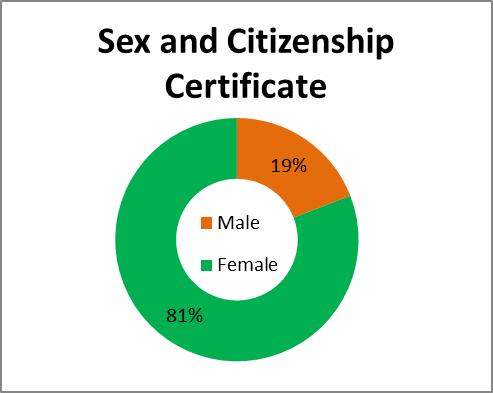
Ethnicity of people not having the Nepalese citizenship certificate
The figure represents that among the individuals not having the citizenship certificate Terai Dalit were the highest (49%) followed by Terai/Madheshi other caste (15%).
Province and deprivation of citizenship certificate
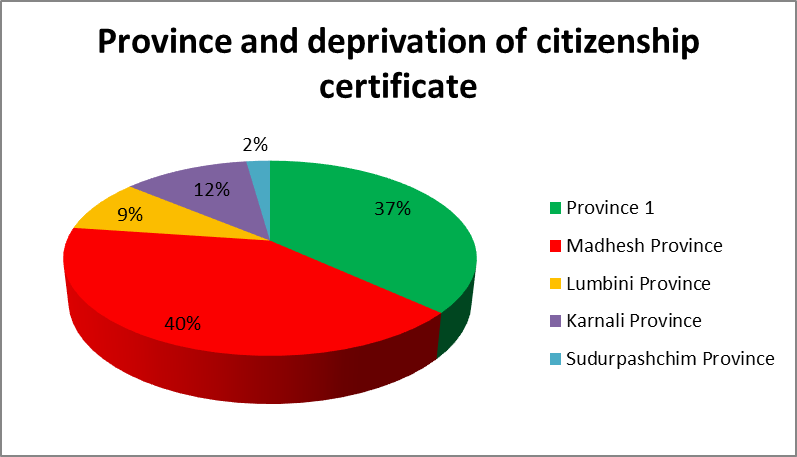
The figure shows that majority of individuals from Madhesh province (40%) individuals did not have citizenship certificate followed by Koshi province (37%).
Occupation
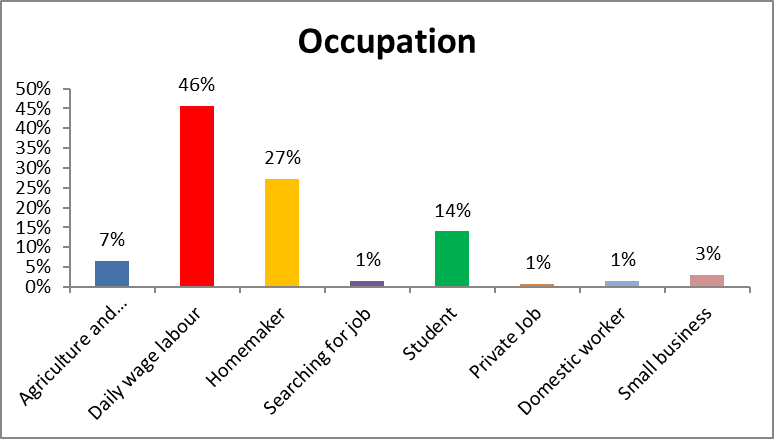
Majrity of the people were engaged in daily wage labor (46%). Likewise, 27 % of people were homemaker and 14 % were students.
Marital status
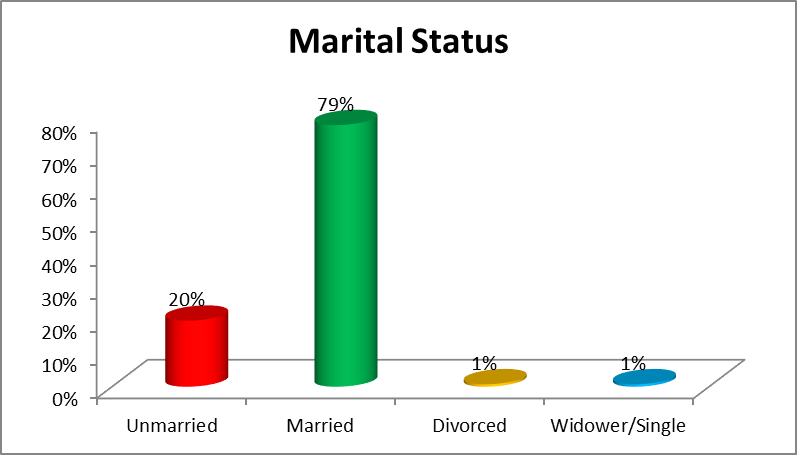
79 % of the individuals not having the citizenship certificate were married followed by 20 % of unmarried individuals.
Educational qualification
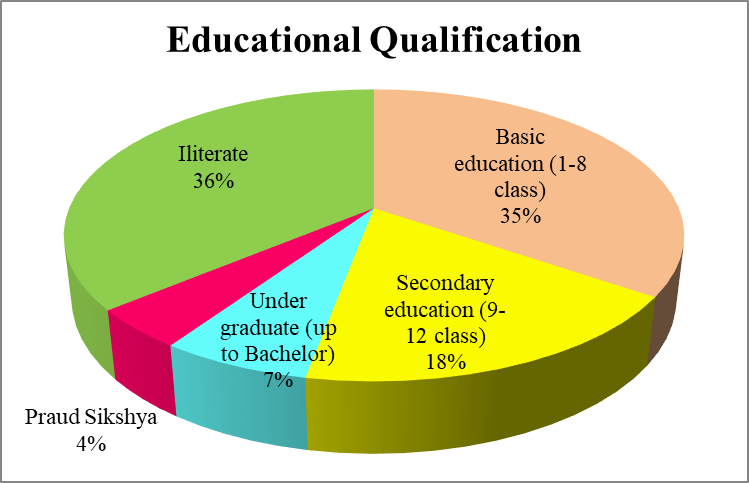
The figure shows that 35 % of total individuals had basic education and 36 % were illiterate.
Challenges in the process of applying for a Citizenship Certificate
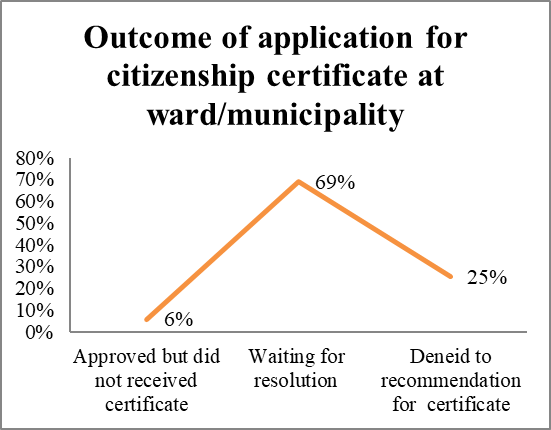
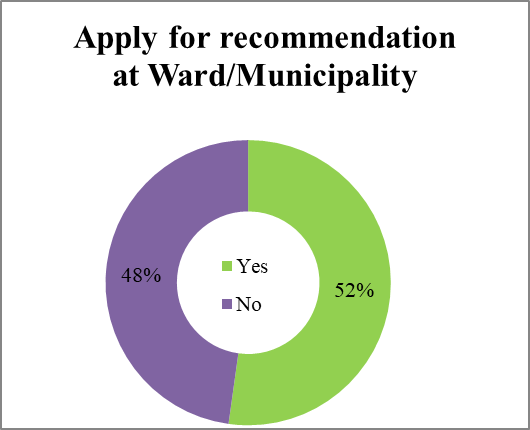
To acquire a citizenship certificate, individuals who are eligible must first visit their respective ward or Municipality and provide the necessary documents to obtain a "recommendation" for the certificate. This recommendation, along with the required documents, is then submitted to the District Administration Office (DAO), where the Chief District Officer (CDO) ultimately decides whether or not to approve the citizenship certificate. Out of the total of 71 individuals (52 percent) who had submitted applications for a citizenship certificate at the Ward/Municipality, 25 percent were denied, 69 percent were still awaiting a decision on their application, and 6 percent had been granted approval but had not yet received their citizenship certificate from the DAO/CDO.
Reason for not applying for citizenship certificate
Based on the data, it is evident that among 136 individuals without citizenship certificates, 48 percent of them had never made an application for a recommendation for the citizenship certificate at their ward or Municipality.
According to Figure, approximately 47 percent (65 respondents) of the 136 individuals surveyed who lacked a citizenship certificate had never applied for one due to several reasons such as 30 respondent stated unsupportive family members (46.2%), 10 responded not having necessary certificates (15.4%), 7 people self-assumed of not getting the certificate (10.8%), 6 people believed community people who said they will not get certificate (9.2%), 5 people lacked knowledge on importance of citizenship certificate (7.7%), 2 women husband were abroad for employment and they did applied for citizenship waiting for their husband (3.1%) and 2 respondent parents not having the citizenship certificate hence they did not apply (3.1%) and 1-1 people pointed out time constraints and financial constraints for not applying to get the citizenship certificate (1.5%).
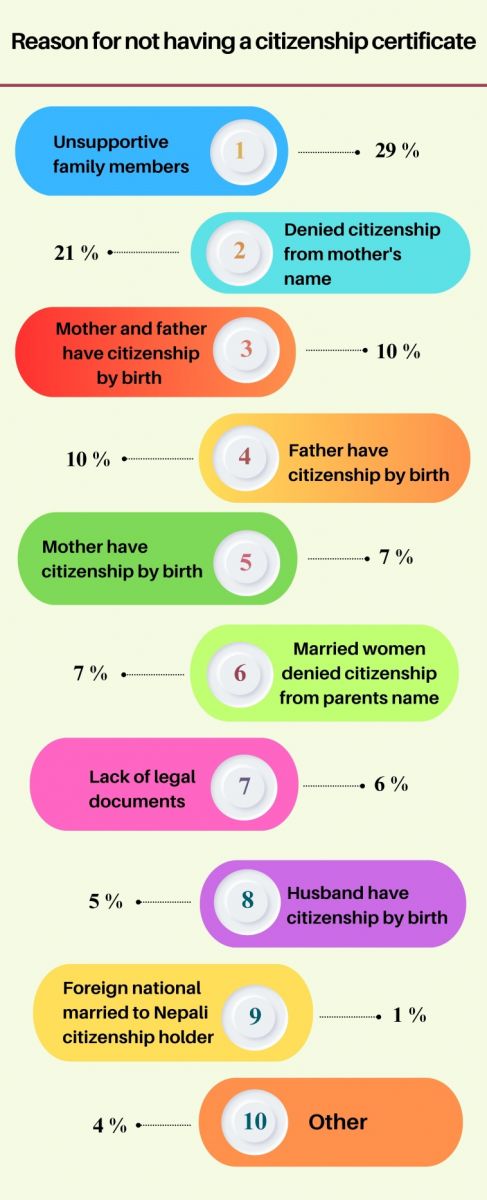
Reason for not having a citizenship certificate
As depicted in the figure, when individuals were asked for not having the citizenship certificate, the majority of the individuals could not get citizenship due to unsupportive family members (29%).
21 percent of individuals could not get citizenship due to unsupportive family members. The reason behind the unsupportive attitude of family members towards girls obtaining citizenship varies. It stems from traditional or cultural norms, gender biases, or specific family dynamics. In majority cases, families prioritize the interests of male members or fear potential changes in property ownership or inheritance rights. Likewise, second highest percentage was denied citizenship from mother's name. Those who were denied citizenship from mother, majority of their father had citizenship by birth, fathers were out of contact and some fathers did not have citizenship. Although, guaranteed rights in constitution and citizenship act they were deprived of citizenship certificate. 10 percent individuals said that they did not have the certificate since both or or any of their parents/partner did not have citizenship by descent and rather had citizenship by birth. Similarly, 7 percent of married women whose partner did not have citizenship when tried to get citizenship from their parents name were not granted the citizenship. This practice is perpetuated by societal norms and deeply ingrained gender roles, where women are expected to prioritize their roles within the marital family and subsume their identity under their husband's family. Under Nepal's citizenship laws, an individual's citizenship is typically derived from their father's citizenship. When a woman marries, there is an expectation that she will take on her husband's family name and become part of his lineage. Consequently, the legal framework and prevailing social attitudes contribute to the denial of citizenship rights to married women based on their parents' names. To obtain a citizenship certificate, a married woman in Nepal is required to provide her birth registration and marriage registration certificates, along with her husband's and father's citizenship certificates. Hence, Nepali women who do not possess a marriage registration certificate are unable to apply for citizenship if they had not acquired it prior to their marriage. This administrative requirement clearly underscores the presence of a gender-biased law and procedure. In one case, an individual was denied citizenship as ward required them to bring the citizenship by descent of father, mother and partner.
Difficulties encountered due to lack of citizenship certificate
Difficulties faced due to the absence of a citizenship certificate can have significant impacts on various aspects of an individual's life. Without a citizenship certificate, individuals may face difficulties in accessing essential services such as education, healthcare, employment opportunities, and social welfare programs. Lack of documentation can lead to exclusion from government-run initiatives designed to support citizens. The absence of a citizenship certificate can create obstacles when dealing with legal and administrative matters. Exclusion from political participation such as voting in elections, running for public office, and actively engaging in civic activities that require proof of citizenship. Without a citizenship certificate, individuals may be more susceptible to exploitation, including human trafficking, forced labor, and other forms of abuse. The figure depicts majority of individuals faced financial difficulties such as opening bank account and saving the income (11.4%) followed by voting during election (11.1 %), access to government benefits (10.1 %) and access to other documents (9.7 %) among many other barriers.
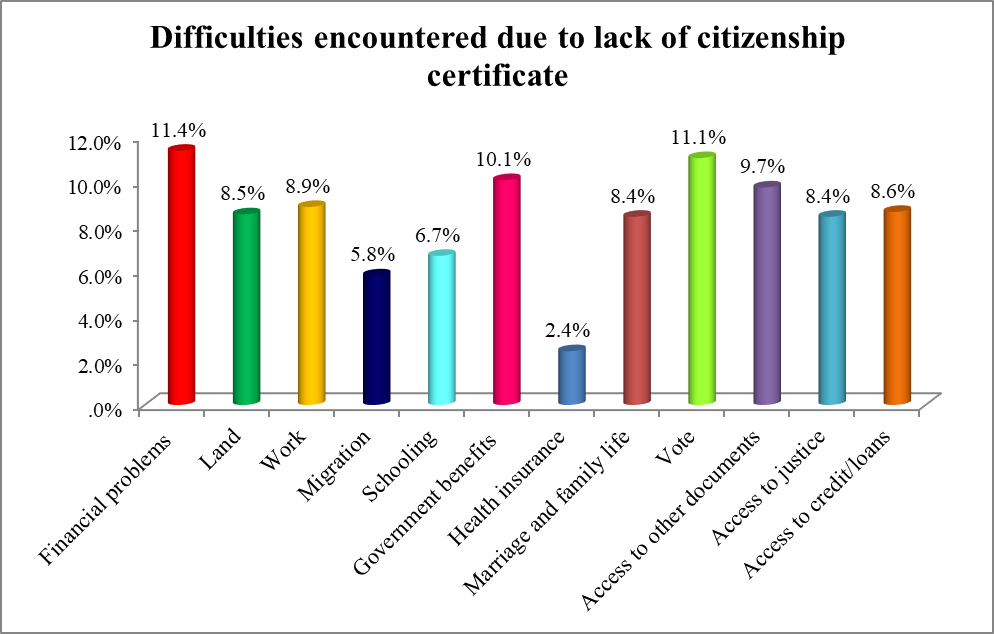
Perceived need of citizenship certificate
When participants were asked about their perceived need of citizenship certificate then most of the individuals said it is needed for them to establish identity proving their nationality and citizenship status (9.8%), open bank account and conduct financial transactions (9%), exercise their right to vote in elections (9.4%), to access various government benefits and social welfare programs that are designed to support citizens (8.8%), to get essential documents, such as a driving license, national identity card, or educational certificates. (8.1%), establish familial relationships, including marriage or parental rights (7.8 %), social security schemes and allowances provided by the government (7.7%), purchasing or transferring property (6.4%), engaging in business activities or trade transactions (6 %), foreign employment(5.3%),), acquire passport (4.3 %), joining the military or enlisting in the armed forces (3.1 %) and get health insurance schemes or policies (0.3%).
Participation at local level planning process
Only 7 percent of individuals states that they have participated in local level planning process.

Decision Making at Home
The data shows that among the individuals lacking citizenship women and girls are disproportionately affected since their participation at decision-making at home is significantly low than male. Likewise, the main decision maker of the house is male in comparison to female. Only 28 women out of 110 women have said that they are the decision maker of the house.
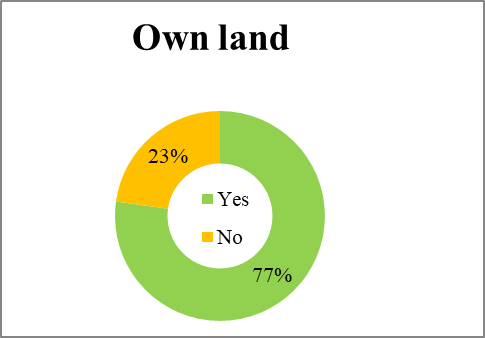
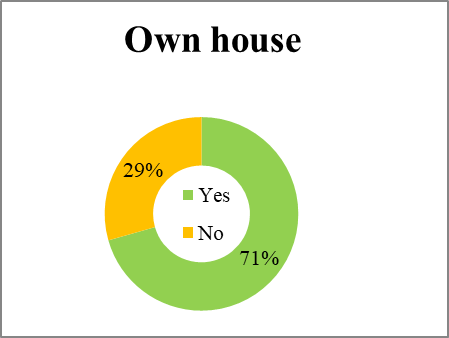
Own land and house
23% of participants do not possess land, while more than a quarter of the participants (29%) do not have ownership of a house.
Problems in accessing the citizenship certificate
|
She is 21 years old Ramila (changed name) from Morang and is currently studying. Her father has citizenship by birth and her mother has citizenship by decent. She went to ward office with all the necessary documents to make the citizenship but was denied as her father does not have citizenship by decent. Though her mother has the citizenship by decent she was refused. My name is Abhishek (name changed). I am 18 years old residing in Sarlahi district. I am unmarried and I work as a daily wage labor. My mother has the citizenship by descent while my father has the citizenship by birth. I have made multiple visits to both the ward office and municipality office in an attempt to acquire citizenship, but unfortunately, I have been unsuccessful to make one from my mother's name. The financial situation of my family is very poor. So, I want to go abroad for employment but I could not because of not having the citizenship certificate. I could not get the allowance allocated for Dalit community by local level. I have been facing many problems in my life owing to lack of citizenship.
|
|
A 49 years old woman from Dang district has not obtained her citizenship certificate yet. Her husband went to India for work and since then he abandoned the family. It has been eight years to his disappearance and she does not know whereabouts of her husband. She has been denied citizenship due to lack of marriage certificate. Her daughter does not even have a birth certificate. She went to ward to get the citizenship from her father but was refused the recommendation as she was married. The ward person said it would be difficult for her daughter to get the citizenship if the mother obtains without the husband citizenship. She has a serious health issue and says because of lack of citizenship she could not get the health insurance. A 24 year old Lali (name changed) from Rukum district do not possess citizenship. She got married at the age of 14 and was living happily. However, after certain period of time, she and her husband went to India for employment. They had three children and both worked hard. She used to get tired and sleep after completing her chores. The husband used to force her for physical relation whenever he wanted but she refused. Making it as an issue he abused her physically and verbally. She could not tolerate the violence and came back to Nepal with children. However, her husband abandoned the family and did not come back. One day she found her husband in the social media and contacted him. When she asked him to make her and children the citizenship certificate, he refused to do so. He said " If you do not need me then why do you need the citizenship form my name". He has married again. I am facing lots of difficulties even in finding small jobs.
|
Obtaining citizenship in Nepal can be hindered by unsupportive family members, which creates obstacles for individuals in the process. To apply for a citizenship certificate, individuals typically need a recommendation from their concerned ward or Municipality. Unsupportive family members may refuse to provide the necessary documentation or endorse the application, making it difficult for the individual to obtain the recommendation. In some cases, unsupportive family members, including husbands, may hold onto traditional gender roles and beliefs. They might be concerned that if a woman obtains citizenship, she may gain property rights or ownership, which could challenge existing power dynamics or inheritance practices. These cultural norms and biases can contribute to the denial or delay of citizenship for women.
|
20 years old Anisha (name changed) residing at Kapilvastu was denied citizenship by the family. Their family do not want to provide their daughter with citizenship because daughter is not meant to claim on father’s property and also soon they will get married a and they again have to make another citizenship from their in-law’s side hence, Nepali citizenship is not even necessary. 19 years Manusi (name changed) from Rupandehi have no citizenship till now, in spite of having birth certificate. Her Father is contactless from last 5 years and mother died 3 years back due to high blood pressure. She and her 4 years old brother are living with their maternal family. Despite their fathers elder brother have the citizenship, he doesnot want to provide her citizenship as this will give her the authority to claim her father’s side of property. Manu is the student but she had to drop out from class 12 due to financial crisis and now she is taking beauty parlor training from nearest Beauty parlor and wanted to initiate her own business as a beautician. Her brother is studying in nursery class. Here maternal family helped her and her brother with their schooling.
|
Nepal granted citizenship by birth to individuals born before mid-April 1990, but their children couldn't acquire citizenship by descent. The requirement was that the child's parent must be a Nepalese citizen at their birth. To address this, the Presidential Decree in 2013 and the "Ordinance to Amend the Nepal Citizenship Act 2007" allow children of parents with citizenship by birth to be eligible for citizenship by descent, regardless of their parents' citizenship certificates at the time of birth. This amendment removes the barrier set by the Interim Constitution, which limited citizenship by descent to those born to Nepalese citizens.
Paragraph 21 implementation restricts women from independently conveying citizenship to their children. Child of a citizen by birth must provide father's citizenship certificate to obtain their own. Mother's certificate is required only if father passed away, accompanied by his certificate. This heavily depends on fathers, posing problems if they refuse, are abroad, deny paternity, or if mother doesn't know or locate him. Children are left stateless. Women should independently use birth certificates to convey citizenship to their children, irrespective of husbands.
In Nepal, individuals who acquire citizenship by birth cannot pass on their citizenship to their children, regardless of their gender or how they acquired citizenship. This restriction denies children the right to inherit their parents' citizenship and can create challenges for families, especially when one parent is a foreign national. Children born to Nepalese citizens who acquired citizenship by birth do not automatically receive Nepalese citizenship themselves.
This policy has faced criticism as it can leave children stateless if they do not qualify for citizenship through other means. Advocacy for reforms aims to enable citizenship transmission through both maternal and paternal lines, promoting gender equality and safeguarding children's rights to inherit their Nepalese parents' citizenship.
|
I am Mahan (name changed) and I am 30 years old. I am from Lahan. My father does not have the citizenship. My mother has a citizenship by birth. I work as a daily wage labor and I want to go to foreign employment to support my family. However, I have been denied citizenship from my mother when I went to ward office for recommendation. A 29-year-old woman named Radhika (name changed) resides in the Dhanusha district without possessing citizenship. Her father passed away many years ago, while her mother acquired citizenship through birth. Radhika lives with her mother following the death of her husband from a heart attack. Despite her husband having citizenship by birth, Radhika encountered insurmountable obstacles in obtaining citizenship herself. Witnessing her daughter's struggles, Radhika's mother encouraged her to pursue tailoring training and even purchased a sewing machine for her. Radhika harbored a desire to start her own business, but the lack of citizenship prevented her from doing so. |
Although the Constitution of Nepal and the Nepal Citizenship Act guarantee gender equality and the right for both Nepalese men and women to pass on citizenship to their children, this right is limited when the father is a foreigner. According to the Constitution of Nepal (2015), the Nepal Citizenship Act (2006), and the Nepal Citizenship Rules (2006), children born to a Nepalese mother and foreign father can potentially acquire citizenship through naturalization if they meet certain criteria, such as being born in Nepal, permanently residing in Nepal, and not acquiring citizenship from another country based on their father's citizenship. Children with Nepalese mothers and foreign fathers often face challenges in obtaining citizenship in Nepal. These challenges primarily stem from the country's citizenship laws and the interpretation and implementation of those laws. Nepal follows a patrilineal citizenship system, where citizenship is primarily passed through the father. This poses a significant hurdle for children with Nepalese mothers and foreign fathers, as their foreign father's citizenship may not be recognized or considered for the purpose of granting Nepalese citizenship.
|
I am 19 years old Suman (name changed) from Sunsari district. My mother has citizenship by citizenship by descent. My father is Indian and has citizenship by birth. I have studied up to class 12. I had interest to give loksewa examination but due to absence of citizenship certificate I could not give the exam. Currently, I am driving a small auto. The ward sent us back when we went to make the citizenship certificate from my mother's name and my father's citizenship is by birth. They say as long as the law does not change we cannot get the citizenship. Because of this, I have mental stress.
|
Some success case stories of obtaining citizenship certificate following persistent efforts
MYAGDI, June 3: Soniya Budha of Darwang in Malika Rural municipality-6 of Myagdi district had to go through a lot of difficulties in lack of citizenship certificate. She was brought up by her mother alone since her father went out of contact. She completed her higher secondary education (10+2) from Janapriya Secondary School, Darwang. As she didn't want her citizenship to be an obstruction for her job, education or any other future endeavors, she requested her mother Jalamaya Budha to make some efforts to get her a citizenship during a visit of the citizenship distribution team of the government. As Jalmaya was trying really hard to get a citizenship for her daughter, her efforts caught the attention of the officials of the District Administration Office (DAO) who were present at a recent mobile camp organized in her village to help facilitate the locals to obtain various government services. Two years ago, Jalmaya had managed to get citizenship for her elder daughter Srijana through her name after much struggle. After furnishing her citizenship along with her elder daughter Srijana's citizenship as a precedent, her younger daughter was easily provided with citizenship 3.
My name is Shyam (name changed), and I am a 19-year-old resident of Barahchhetra municipality, Sunsari. When I was just one year old, my father went abroad for employment and never returned. Throughout this time, my mother has been taking care of me. While all my friends managed to obtain their citizenship certificates by the age of 16, I faced difficulties in acquiring mine, which hindered my ability to work and support my family. Despite my numerous attempts, I was unsuccessful, and some individuals even demanded large sums of money, claiming they could assist in obtaining the citizenship. This left me feeling extremely saddened, causing loss of appetite and a reluctance to leave the house. My dream of earning and taking care of my mother was slowly fading away. However, my mother eventually learned about WOREC and sought their assistance. With their support, I was able to obtain the citizenship certificate under my mother's name. I am currently filled with immense happiness and gratitude.
My name is Prashamsa (name changed) and I am 28 years old residing in Kapilvastu municipality ward-3. Due to my lack of citizenship, I was unable to secure a job in adult education during my 12th grade. Despite seeing my friends employed, I held onto the dream of finding a job. However, my citizenship status hindered me, as sons and daughters did not automatically receive citizenship based on birth citizenship certificate of their parents. Determined, I applied for a computer operator position at the women and children's office and attended an interview. While cycling in a race, I felt an overwhelming sense of freedom. Unfortunately, this joy was short-lived, as three months later, I was asked to provide my citizenship at the office. Without citizenship, I was told I could not continue in the job and had to resign. It felt as if my wings had been clipped and a heavy burden had befallen me.
Despite my best efforts, I returned home in tears, arguing with my father about why he hadn't arranged for my citizenship. My visits to the district administration office proved futile, as they explained that children whose fathers obtained citizenship through birth certificates could not be granted citizenship. One staff member even suggested, "Why worry? If you marry a Nepali boy, you'll obtain citizenship." At that moment, I desperately desired citizenship, yet I retorted by suggesting that the staff member's son marry me and grant me citizenship, after which I would divorce him. It was tragic that in our country, a daughter needed citizenship to stand on her own two feet, and the only way to obtain it was through marriage.
Afterward, I learned from my uncle about Madhesh Human Rights Home (Mahuri Home), which was working on the issue of citizenship. They established a Stateless Youth Struggle Committee, spanning three districts—Rupandehi, Nawalparasi, Kapilvastu—and extending to Kathmandu. As the chairman of the central-level committee, I advocated for the citizenship campaign. Various political leaders were busy promoting their own parties during the constitutional process. Advocate Dipendra Jha became involved in my case to ensure the success of the citizenship campaign. We visited district administration offices, submitted memoranda, held meetings in Baluwatar, Kathmandu, and organized dialogue programs at the Reporters Club. Finally, when the constitution of Nepal was amended, I received citizenship based on descent, as the children of fathers who obtained citizenship by birth in the year 2070 B.S.
Recommendation